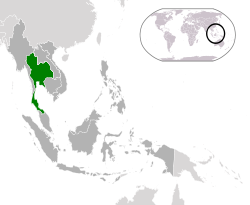Thailand: Street Protests And Fresh Political Turmoil – Analysis
By IPCS
By Panchali Saikia
In June 2012, Bangkok witnessed protests by thousands of Red Shirts led by the United Front for Democracy, which is likely to have an impact on the larger political environment and economy of the country. What is the reason behind these protests? Are these a follow-up to the earlier political turmoil in 2008?
Reconciliation bills of the Pheu Thai government

The atmosphere heated up on the streets of the capital when the Pheu Thai-led government forwarded its reconciliation bills to the House of Representatives to amend the 2007 constitution.
The content of the reconciliation bills has led to major controversies and allegations against the ruling government. They propose three major changes which have been highly criticised by the opposition: first, the people who were involved in any act of political protest from 15 September 2005 to 10 May 2011 would be granted amnesty. Second, the orders of the Assets Scrutiny Committee that investigated corruption cases against the Thaksin administration would be withdrawn; forming a new judicial process to review the charges. Third, the right to contest elections would be returned to the political party executives of the dissolved political parties (A review of the Thai Reconciliation Bills, Asian Correspondent, 5 June 2012).
The bills also propose to amend Article 291 and change the process of amending the constitution which is currently the authority within the parliament. The proposed bill seeks to establish a Constitution Drafting Assembly (CDA) which will be formed through a referendum and will have the power to amend the constitution. The CDA will consist of 99 members: representatives elected from 77 provinces of Thailand and 22 legal experts selected by the parliament. The political parties will not be a part of the sittings of the assembly according to the proposed bills. The opposition is concerned that such amendments would create a constitution favourable for the Pheu Thai party and its supporters.
Protests against the bills: Who and why?
The opposition and the Yellow Shirts are against the bills; their major concerns include: once the bills becomes law, they would grant amnesty for various political offences committed through the last six years, including to the exiled former PM, Thaksin Shinawatra, who was convicted in corruption-related cases in 2008. The opposition believes that the bills are an effort by the ruling party to bring back Thaksin into the political scenario of Thailand.
Judicial intervention and response from the Red Shirts
With no other option to legally protest against the amendments, petitions were filed against the reconciliation bills by senators and opposition party MPs in the constitutional court. The court accepted the petitions stating that the amendments could threaten the constitutional monarchy. Subsequently, on 2 June 2012, it ordered a stay on the parliamentary debate over the constitutional amendment process on the grounds that the proposed amendments violated Article 68 of the constitution which states, ‘No person shall exercise the rights and liberties prescribed in the Constitution to overthrow the democratic regime of government with the King as Head of State under this Constitution’.
The court’s intervention provoked the Pheu Thai party and the pro-Thaksin Red Shirts to come out in protest on 24 June. They alleged that the court had acted outside its jurisdiction by taking a decision before the Office of the Attorney General could scrutinise the petitions and therefore its order was not legally binding before parliament.
Judicial ruling has played a pivotal role in the history of Thai politics, causing the fall of two pro-Thaksin governments in 2008. In this context, the Pheu Thai and its supporters are worried about the court’s intervention in the amendment process. The Red Shirts have started a campaign to seek impeachment of seven of the eight court judges who voted to support to put a halt to the final debate of the amendment bills in parliament.
Another round of violent turmoil?
The situation in Thailand is now locked in a position of political divisiveness owing to the debate between the judiciary and legislature, and the political rift between the ruling and the opposition parties. Whatever the court’s final verdict will be, it will spark a political unrest. If the court decides against the amendment of the charter, the Red Shirts will stage a protest to defy the court’s order. If the Pheu Thai and its supporters refuse to accept the court’s order, it would mean a violation of Article 216 of the constitution that states that decisions of the Constitution Court are final and legally binding on parliament and all state organisations. On the other hand, if the bill is passed, protests will continue in the streets of Bangkok by the Yellow Shirts. In such a situation, amid the shaken balance of power between the judiciary and legislative and administrative arms, Thai politics may experience another constitutional crisis or a judicial coup.
Panchali Saikia
Research Officer, IPCS
email: [email protected]
